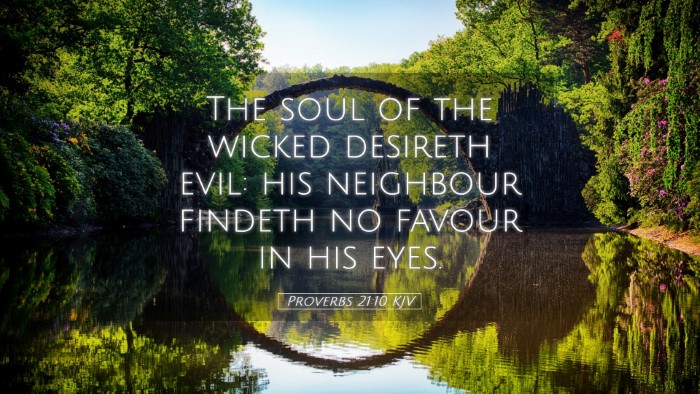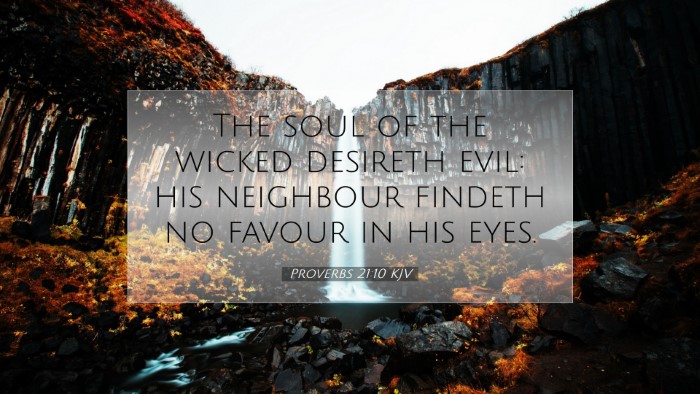Commentary on Proverbs 21:10
Proverbs 21:10 states, "The soul of the wicked desireth evil: his neighbour findeth no favour in his eyes."
This verse encapsulates a profound insight into the nature of wickedness and the implications it has on relationships. Let us glean from historical commentaries to unravel its depths.
Insight from Matthew Henry
Matthew Henry emphasizes that the wickedness of the heart always seeks evil not only for itself but also desires to inflict harm upon others. He states that those who are wicked have an innate tendency to find pleasure in the downfall or misfortune of others. Henry points out that the wicked do not merely harbor ill desires; they actively pursue them, showcasing a character that revels in malevolence.
Furthermore, he notes that the word 'soul' here reflects the essence of the wicked one, indicating that their core being is entwined with their desiring of evil. The verse illustrates how such a disposition leads to an inevitable disfavor towards their neighbors, as they cannot genuinely feel compassion or kindness towards anyone.
Insight from Albert Barnes
Albert Barnes expands upon the relational dynamics captured in this verse. He identifies that the "soul of the wicked" captures not merely an external behavior but reveals a deeper spiritual and ethical decay. Barnes argues that this desire for evil manifests in actions that ultimately lead to strife and hatred, obstructing the ability to maintain equitable and loving relations with others.
He further emphasizes that being wicked is characterized by a lack of joy in the happiness of others, which leads to a landscape of mistrust and animosity. Barnes reminds readers that those who desire evil for themselves and others are often marked by an inability to find genuine contentment in righteous or virtuous endeavors. The "neighbor" mentioned represents those who are closest to us, underscoring that evil desires result in a widespread, pervasive lack of favor or goodwill that disrupts societal harmony.
Insights from Adam Clarke
Adam Clarke takes a more analytical approach, positing that the desire for evil is not only a reflection of inner turmoil but also a contributor to societal unrest. Clarke notes that the wicked person often pursues their self-interest at the expense of others, leading to a loss of trust and mutual respect within communities. His commentary focuses on the devastating ripple effects of malevolent desires on social structures.
Clarke remarks that this verse offers a sobering reminder of the spiritual consequences of wickedness. He highlights that the absence of favor in one's neighbor is indicative of a corrupted moral compass. The pursuit of evil inherently leads to a lifestyle that fosters animosity and division, as there can be no genuine connection with those whom one is intent on harming or exploiting.
Theological Reflections
The implications of Proverbs 21:10 transcend individual behaviors and echo through the collective consciousness of communities. When wickedness is allowed to flourish—both in action and heart—communities face significant challenges in governance, unity, and mutual respect.
For pastors and theologians, this verse serves as a cautionary testament to the nature of sin and its broader ramifications. It challenges spiritual leaders to maintain a vigilant heart and to teach their congregations about the necessity of cultivating virtues that promote love and righteousness.
Moreover, this verse calls on Christians to reflect on their own hearts—asking whether they harbor any wicked desires that may disrupt their relationships or contribute to a culture of disfavor.
Conclusion
Proverbs 21:10 reminds us that the soul's desires dictate one's actions and ultimately define relationships. The collective insights of Matthew Henry, Albert Barnes, and Adam Clarke converge to highlight the dire consequences of evildoing not only on oneself but also on others.
Pastors, students, and scholars are therefore encouraged to internalize the wisdom found within this verse, as it outlines both a personal and communal responsibility to pursue good, promote favor among neighbors, and remain vigilant against the seductions of wicked desires.


